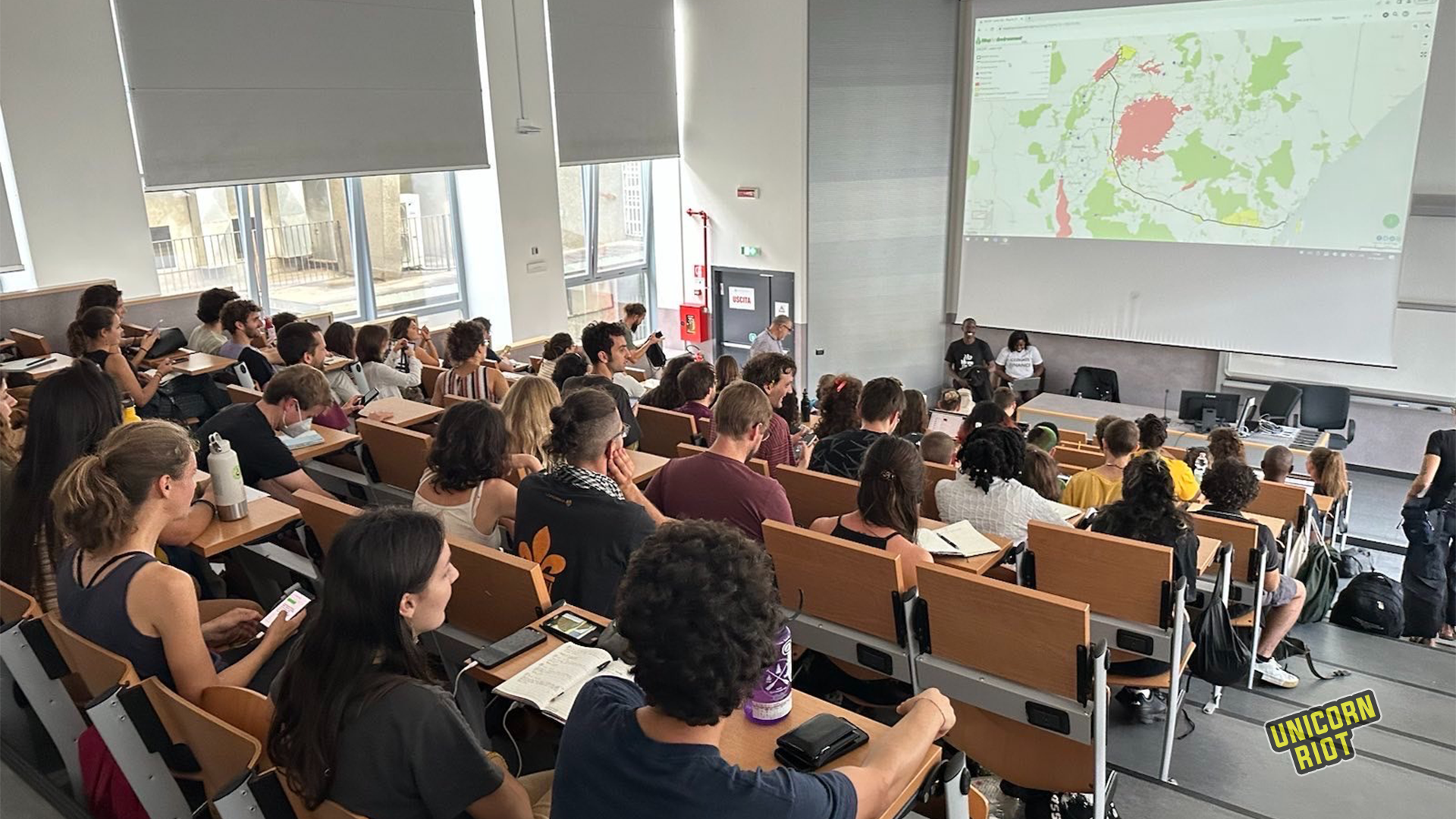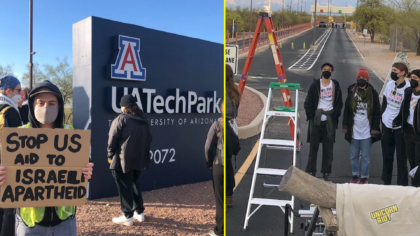International Solidarity Fostered at the First Ever ‘World Congress for Climate Justice’
Milan, Italy — For many years, transnational movements like “Fridays for Future” or “Extinction Rebellion” have tried to push governments to comply with the 1.5 C climate threshold set in 2015 by the Paris Agreement, yet activists believe not enough has changed. The struggles against mega-projects — be it coal mines, pipelines, motorways, train lines, construction for Olympic games, or water privatization — are still happening in every continent, and many are crying out for an immediate reaction to a dystopian future. One such reaction happened in October in Milan, Italy: The World Congress for Climate Justice (WCCJ).
With the proclaimed goal to form the first International of the climate justice movement, the event participants actively worked in solidarity with each other to go up against governments across the world that are focusing less on meaningful climate policy and more on trying to establish “green capitalist” strategies to protect the markets.
The Congress
One of the congress organizers is Alex Foti. Beginning in the 2000s, he restarted the annual May Day protests in Milan and other cities, pivoting away from a traditional labor approach to a focus on part-time and temporary work and thus created the “EuroMayDay” network.
For Foti, “the congress is an attempt to form a first international unification of radical environmental movements from all over the world in the struggle against fossil capital.” He believes that five years after Greta Thunberg and Roger Hallam launched their respective movements, the climate movement seems to have literally hit the wall.
“It has virtually become part of the U.N. administration, but then the U.N. secretary tells us that we are on a highway to hell – so who is going to take care of us? The point of autonomous movements has always been to say we’ll take care of ourselves.”
Alex Foti, WCCJ organizer
In his opinion, the effective strategy seems to be more like the “A22” movement with the highway occupation in The Hague or the actions of the “Last Generation” and “Scientists Rebellion,” because they “brought the conversation about climate into every household.”
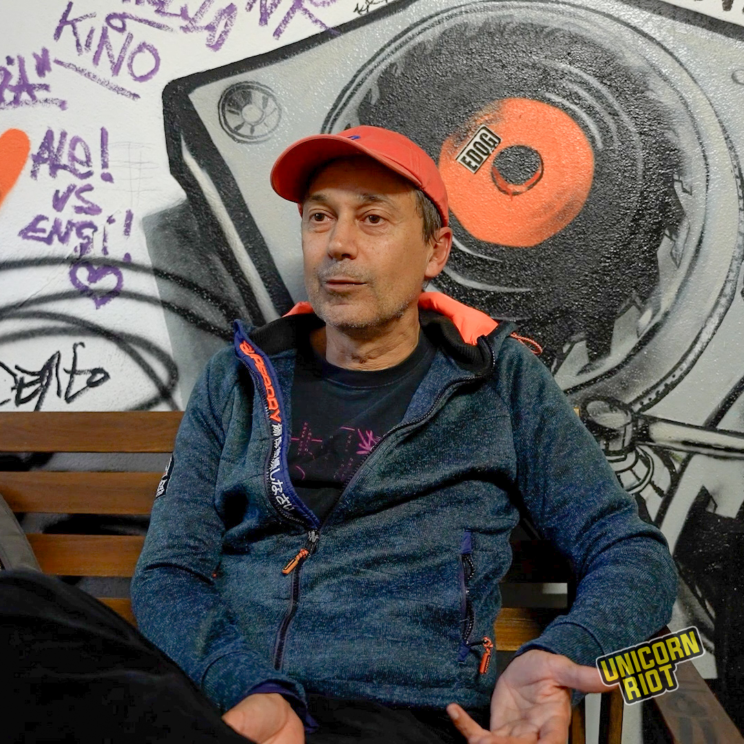
The first day of the congress was dedicated to “artivism,” that is, the combination of art and social action in public space. Activists from the art scene discussed a “Radical Ecologies Manifesto” and listened to a performance talk from “Yes Men” about the “Barbie Liberation Organization.”
The second day was dedicated to seminars where delegates presented their struggles, including an ongoing campaign against an oil pipeline in East Africa and the civil society alliance, YASunidos, from Ecuador, which successfully led a campaign to stop oil drilling through a referendum.
On the third day, nine thematic meetings were held to discuss common issues such as eco-transfeminism, direct action and repression, and ideological issues. There was also a question and answer session with Roger Hallam, the founder of Extinction Rebellion, and a meeting on Agroecology with Erick Zelaya, from the indigenous movement in El Salvador, and Li Wakware, from Pueblo y Barrio Honduras.
“We tried to gather concrete proposals from all these meetings, which were discussed in the plenary meeting we held at Leoncavallo, Italy’s [first] social center,” explained Foti.
Climate Justice International was formed from the idea of creating an international space where all kinds of struggles can be supported. The delegates talked about the idea of common financial funds that can be used to counter political repression and, above all, common slogans and days of action in a specific city.
A special convergence where the movements can show again that they are a mass movement – something many feel is missing. The climate strikes were huge in Germany and some other countries, but in the rest of the world, the protests are on a smaller scale. The idea is that there needs to be an international that acts as a multiplier.
“The World Congress for Climate Justice, for four days [brought together] around 200 delegates from 66 movements, collectives, unions, territories and social spaces from almost 30 countries. 45 workshops, seminars, assemblies, and actions have been carried on to constitute the radical, anti-capitalist, anti-speciesist, eco-transfeminist and anti-colonial organization of the global climate movement: the International for Climate Justice.“
Alex Foti
The Struggles of the Global South
The Mexican railway construction project, Tren Maya, which has sparked fierce debate, is a prestige project for the current President of Mexico, Andrés Manuel López Obrador. Some regard it as a promising new tool for tourism and economic development; there is hope that the Maya train could even usher in a new golden age of rail travel.
However, others fear an ecological disaster in one of the most ecologically and archaeologically sensitive places in the world. Mina Morsan, of El Sur Resiste, is one of the project’s opponents who spoke at the congress during the panel “Milpamérica Resiste.”
Throughout Mexico, various indigenous groups, associations, and civil society groups have united against the project. These groups fear an ecological disaster; the already rare water would vanish and places of natural habitat will be disturbed and partly destroyed with severe consequences for animals such as pumas and jaguars.
A possible explosion of tourism due to the new travel possibilities will reinforce these developments. According to Morsan, the train will mainly be used to transport fossil fuels. 20 percent of the train will be “for passengers and the rest for commercial use in order to transport oil, gasoline and things like that over the peninsula,” said Morsan.
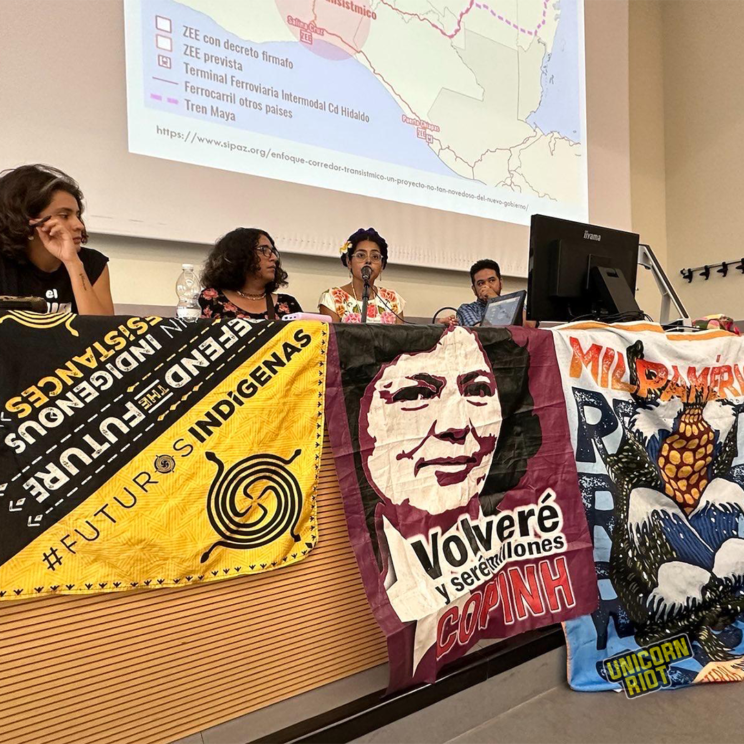
During the Futuras Indigenous Panel, Rosa Marina Flores Cruz, from the group Futuras Indigenas, talked about the consequences of green capitalism. She noted that transnational corporations are “using indigenous lands to produce [energy]” while the benefits and proceeds don’t go back to the stewards of the land who live there.
“They are using indigenous lands to produce energy. Most of the investments came from Europe, particularly from Spain, but there is also French capital and Italian capital. And then [there’s] a company that had one of these windmill parks in my region, and they are [also] producing power for private companies like Coca-Cola [and] a big mining company in Mexico; Grupo Mexico, that belongs to one of the richest [people] in Mexico.”
Rosa Marina Flores Cruz of Futuras Indigenas
Another WCCJ workshop focused on the project of an oil pipeline in East Africa. Activist Aidah Nakku, from the Africa-based “Rise Up Movement,” explained the severe consequences that the pipeline’s construction will have on the local population — which is being displaced. Several rare and unique species are also threatened as a result of the pipeline construction.
“When it comes to climate, it’s going to produce around 34 million tons of carbon dioxide into the atmosphere every year.” Nakku further wished for support from people in Europe: “People in the Global North can ask their governments and companies to stop the funding of this project; especially the big energy company, ‘Total’ in France, which is one of the main funders.“
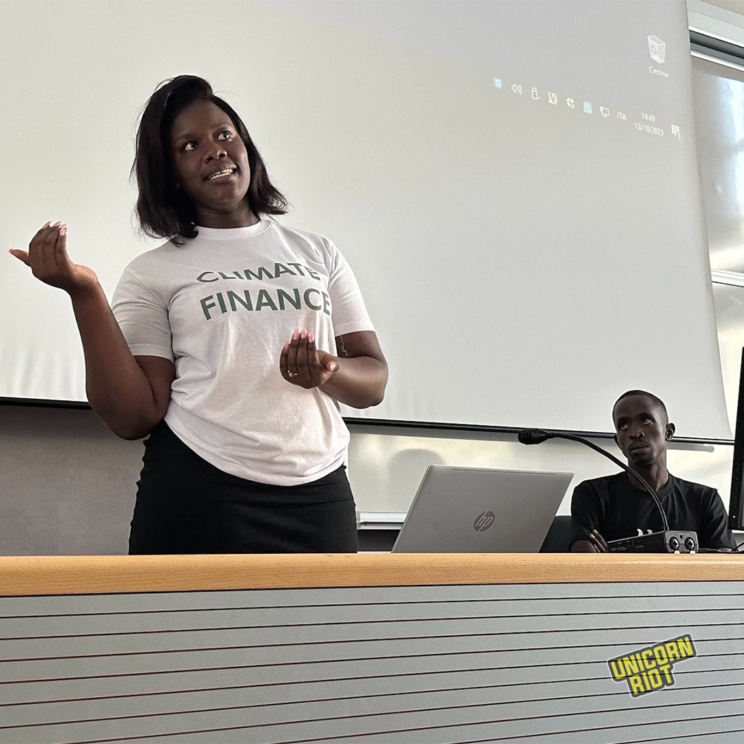
‘To the mountain, to the city. Unsustainable games’ – Against the 2026 Winter Olympics
One focus of the congress was the local struggle against the upcoming 2026 Winter Olympic Games in Milan-Cortina. The main part of the winter sports activities will take place in the Alps of Cortina d’Ampezzo in northern Italy near the Austrian border, and 350km from Milan – the co-hosting venue. Milan is the biggest metropolis in northern Italy and is known for its fashion weeks and media establishment.
Many recent Olympic Gaming events have been criticized for rampant corruption and wasteful spending. For example, in Italy, the Turin 2006 Winter Olympics ended with a massive debt balance and many unused sports venues. Environmental NGOs and many people who live in the Alps are also criticizing planned projects like the new building of a new bobsled track in Cortina.
Resistance is growing in Milan as many residents have bad memories from international events; most notably, the World Exposition of 2015. Many Milan residents fear the further privatization of a city where the rents continue to rise and lower-income citizens are excluded. The Airbnb industry is also in full development due to mass tourism and hugely publicized international events.
A demonstration on the third day of the congress had more than 500 people and 100 bicycles in attendance. The demo started at the University of Milan, where the main part of the congress was taking place. They marched through the inner city with banners, shields, and slogans against the Olympic Games and for the worldwide climate justice movement.
At the end of the demo, a large portion of the crowd stormed a construction site of the new Olympic Village. They temporarily occupied the space and organized an assembly. The speeches held at the assembly criticized the environmental and social consequences of the Olympics on the city’s infrastructure and population.
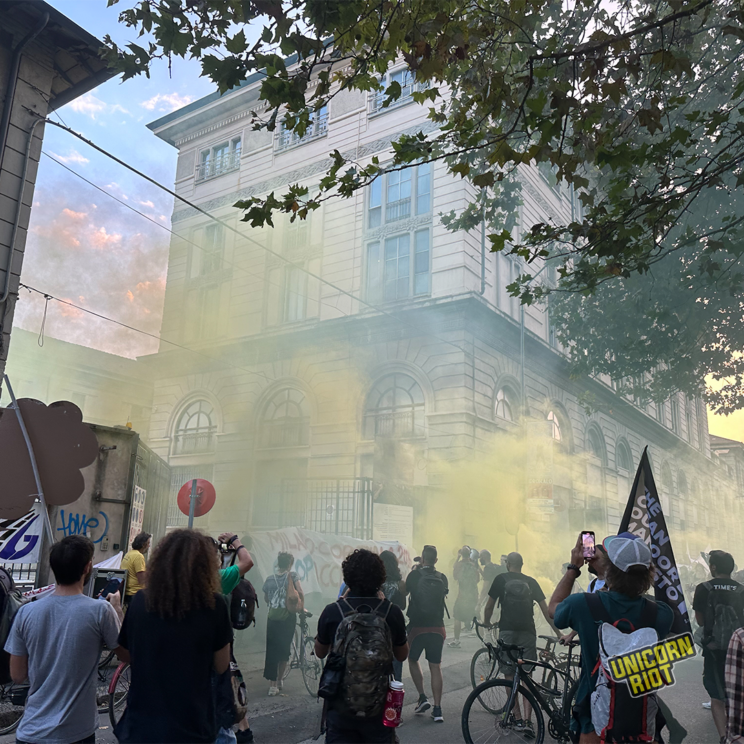
Analysis: Challenges and Outlook
The third and fourth days of the WCCJ were focused on finding common ground for future cooperation between the delegates and groups present in Milan and connecting with people all over the world were weren’t present.
Aside from the good discussions, education, connections, and planning, the WCCJ had its shortcomings. Questions of representation, division of Global North and South, and Eurocentrism were present throughout the weekend.
The plenary on the last day also revealed a split between different participants in strategy, with some preferring to act quickly, and others in a slower and potentially more coherent manner. Emergency action is one of the basic challenges a climate justice movement has to handle, as pressure from the upcoming catastrophe increases and is felt in different ways in different corners of the planet.
One of the approved proposals that came out of the WCCJ was the establishment of a common discussion platform organized by an International Committee with the consistent participation of groups and movements via delegates. This committee will also decide where the next World Congress for Climate Justice will take place.
In the coming months, the activists say they “aim to define a common slogan and organize simultaneous demonstrations in multiple countries.” They outlined three action items to achieve this:
“1) boycott and counter the capital infrastructures, the production lines of multinational corporations, and the big events promoted by capitalism as consensus tools to perpetuate financial speculation, environmental degradation, animal exploitation, and social marginalization.
2) democratize and raise public awareness to go beyond the actual global crisis.
3) share and exchange existing best practices.”
World Congress for Climate Justice
RELATED
The Battle of Sainte-Soline [April 2023]
Police Evict Environmental Protesters from Lützerath, Germany [Jan. 2023]
Mass Protests by Climate Activists Follow Eviction of Occupied German Village [Jan. 2023]
Sabotage and Civil Disobedience in France: The Fight Against Mega-Basins and Water Grabbing [Nov. 2022]
Follow us on X (aka Twitter), Facebook, YouTube, Vimeo, Instagram, Mastodon, Threads, BlueSky and Patreon.
Please consider a tax-deductible donation to help sustain our horizontally-organized, non-profit media organization:

